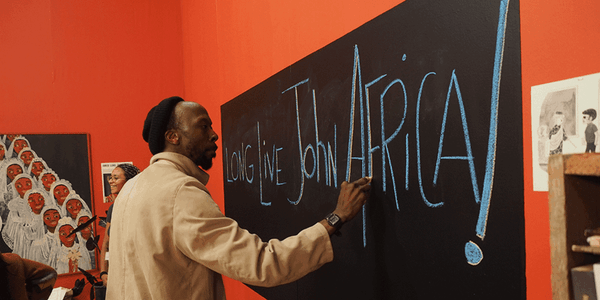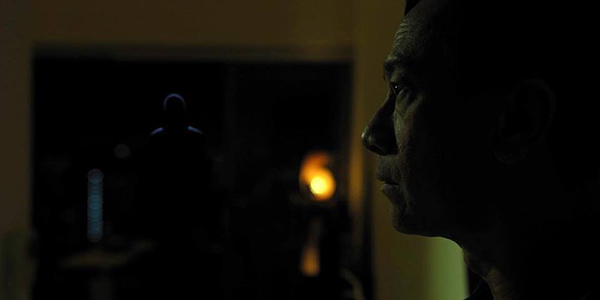NYFF 2020: THE INHERITANCE: The Radical Act of Cinema
Ephraim Asili’s The Inheritance is the most culturally relevant film of the year. This year’s slate at the New York Film Festival is filled with documentaries and stories of liberation movements, theories on social change, and reflections of a crumbling American empire. Films like Her Socialist Smile and MLK/FBI at the festival center on well-renown figures and their dedicated moral and political struggles for social change. The Inheritance, however, is jam-packed with stories of liberationists most Americans will have never heard of, events – like the Philadelphia bombing of the MOVE organization – that seem almost impossible to contextualize beyond pure totalitarian savagery, and political movements and grass-roots organizing efforts that seem astoundingly bold for a country which has successfully neutered and pacified most of its populace into a slumber, but for a few weeks here or there where they go through the symbolic motions of holding up clever signs at protests.
A History to Carry Into the Future
In The Inheritance, Asili delivers a history lesson through self-reflective recreation of his own discovery of Black liberation movements in America. The film centers around two young Black people – a man and woman – who decide to move in together and form a collective. They turn their apartment into a communal space for Black citizens to foster dialogue and education on the history of Black revolutionaries. They call in speakers to talk about major efforts in the past, like the Black Panthers and the MOVE organization, which also strove to form communities outside and beyond the reaches of capitalist-controlled society. What we get is a film essay in which we learn as we witness the passing of Black knowledge from one generation to the next.

Sustained liberation movements depend on building off of the past, returning to people and places that revitalize the teachings and lessons of those events, and educating the future generations on how to carry the struggle. Asili’s directorial choices – largely influenced by Godard’s La chinoise of who’s poster hangs on the commune’s kitchen wall – splice conversations between young Black organizers of today with references of books, artworks, written poetry, and famous slogans by famous Black activists, liberationists, poets, and filmmakers. We see names like Margaret Walker, W.E.B. Dubois, Angela Davis, and Elaine Brown pop up as single shots of books stacked on a shelf, or laid out on a table. They are the books that shaped Asili and the books that shaped the modern Black liberationist at large and which provide the foundation for change that we seek in these times. In displaying these books as standalone shots, long enough that we can glimpse the title and author and in hopes that we may write them down, they function as direct, unsubtle recommendations – a hand nudging us the direction of a Black history we most likely were deprived of in our schools and universities.
It is not lost on Asili of course, that focusing Black liberation through overly academic and scholarly lenses tends to lead people to sitting around theorizing about social conditions rather than having lived them. Asili himself is a graduate of Bard College, but his approach to Marxism and Black liberation has not merely been informed through the books and movies he was watched (Jean-Luc Godard is a repeated influence and reference in The Inheritance) but also his own experiences as an active part of a Marxist collective. In an interview with BOMB Magazine, Asili mentions how this combination of theory and action ties into his philosophy behind The Inheritance’s creation – more specifically, Godard’s idea that “it is not enough to make political films; you have to make films politically.”
More than Just a Director’s Movie
This is perhaps the defining factor of what makes The Inheritance different and more urgent than other political films that have come out in recent times. Hollywood of late has invested money into making marketing campaigns for its movies which paint them in a social justice veneer while keeping the same austere hiring and production practices that exploit the creators and keep the financiers feeling both self-proud at their meaningless displays of wokeness and safe from having to commit to any real change to their industrial web. Asili’s production features some professional actors, several non-professional students from Bard College, and famous Black artists and revolutionaries who were all given the agency and power to contribute ideas to the film. The radical collectivist productions of the film contribute to its radical structure, which features jump-cuts in and out of the narrative to lectures by real-life figures such as former and current members of John Africa’s MOVE collective in Philadelphia and a special performance by poet/singer Ursula Rucker. Like its title suggests, The Inheritance is heavily dedicated to the idea of sharing knowledge through time, from one group of Black revolutionaries to the next, like heirlooms of hope and pain.

If there is anything to be improved upon in Asili’s approach it’s the common struggle of most debut filmmakers to tend to say everything at once. There is a veritable museum’s worth of information and history crammed into The Inheritance and much of it moves at a rapid pace, forgoing its contextual importance to modern times. The film features young Black people learning from the revolutionaries of the past, but not really discussing the implications of these actions for a completely different world that exists today than what existed in the 60’s and 70’s.
Conclusion
While idealistic in words, there is a real difficulty to communal living in how so far removed it is from technologically connected and socially isolated lives of most young people today that it becomes harder and harder to organize. The young Black individuals in the film have differing views on guns, sexuality, music, democratization, consensus decision-making, and other issues. There is a collective struggle and fervor in the film that is both hopeful and introspective as a microcosm of the difficulty of coalition-building in 2020 America. This struggle of young Black people in a modern society filled with distractions and a spectrum of ideas is what helps Asili’s film shine as an example of theory vs. practice in Marxist thought. As a collaborative effort to both engage and educate people, The Inheritance is a rare example of political activism and cinema intertwining organically and seamlessly.
The Inheritance played at the 2020 New York Film Festival
Watch The Inheritance
Does content like this matter to you?
Become a Member and support film journalism. Unlock access to all of Film Inquiry`s great articles. Join a community of like-minded readers who are passionate about cinema – get access to our private members Network, give back to independent filmmakers, and more.
Join now!





